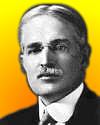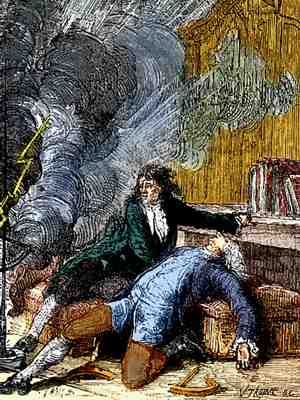 (source)
(source)
|
Theodore William Richards
(31 Jan 1868 - 2 Apr 1928)
American analytical chemist.
|
The Lightning Experiment of Georg Richmann
On August 6, 1753, Professor Georg Wilhelm Richmann of St. Petersburg died, caused by his experiment to attract lightning. The colleague with him at the time, M. Sokolaw, engraver to the Academy at St. Petersburg, was also stunned by the bolt of electricity, but survived.
To investigate lightning, Richmann had attached a wire to the top of his house and led it down to connect with apparatus inside a room. An account of the fatal accident was transmitted by the Academy to the Court, in a letter from Moscow, dated 23 Aug 1953. Benjamin Franklin received a copy, perhaps from an English newspaper or periodical, and published an extract of the information in The Pennsylvania Gazette (5 Mar 1754).
“On the 6th of August, towards Noon, M. Richmann perceiving a Tempest arising Northwards, he prepared for making Electrical Observations, or the Means for averting the Effects of Thunder, according to the Method practised by Mr. Franklin, of Philadelphia. With him as M. Sokolaw, Engraver to the Academy. The Place for the Experiment was a Kind of Gallery, with its Entrance towards the North, and a Window towards the South. Whether the Window was open is not known; all that is certain is, that near the Window was a Cupboard four Feet long, on which were placed the electrical Needle, and a Vessel of Water, partly filled with Brass Filings, over which came an Iron Bar about an Inch thick, and a Foot long, fastened at the Top to a Wire which came down from the Roof of the House, through the Gallery Door. The Professor, judging from the Needle that the Tempest was at a great Distance, assured M. Sokolaw that there was no Danger, but that there might be at the Approach. M. Richmann stood about a Foot from the Bar, attentively observing the Needle. Soon after M. Sokolaw saw, the Machine being untouched, a Globe of blue and whitish Fire, about four Inches Diameter, dart from the Bar against M. Richmann’s Forehead, who fell backwards without the least Outcry. This was succeeded by an Explosion like that of a small Cannon, which also threw M. Sokolaw on the Floor, feeling as it were some Blows on his Back. It has since been found that the Wire breaking, some Bits had hit him behind, and left the Marks of Burning on his Clothes. Being a little recovered he (Sokolaw) got up, and leaning against the Cupboard, he directed his Eyes to M. Richmann, whom he imagined to be no more than stunn’d, but a thick Smoak hindering him from seeing his Face, he apprehended the House had taken Fire, and ran out to call the Picket Guard. Mrs. Richmann having heard the Noise, came into the Gallery, and found it full of Smoak. M. Sokolaw was gone out before. This Gentlewoman at her Return thither, saw her Husband stretched out on his Back, without any Sign of Life; nor could all the Means she used recover him from what she flattered herself was no more than a Lethargy. Professor Kratzenstein coming with a Surgeon, a Vein was opened, out of which came only one single Drop of Blood. M. Kratzenstein endeavoured several Times to blow into his Breast, an usual Practice on suffocated Persons, all to no Effect. There was no Pulse, nor the least Sign of any Convulsion in any Part of his Body. In the upper Part of his Forehead, where the Hairs begin to shew themselves, was an oval round Spot, about the Bigness of a Rouble, a little to the Left, where the Blood had been as it were pressed by the Pores, without damaging the Skin. His Left Shoe was torn in two Places on the same Side, without any Mark of Burning, but small whitish Specks near the Rents; upon pulling off his Shoes and Stockings, there was in the same Place a Spot of extravasated Blood, the Bigness of a Rouble. On the Left Side of his Body, from the Hips to the Neck, were eight Spots, red and blue, besides others, like those caused by Gunpowder. The two Jambs of the Gallery Door were split from End to End, and, together with the Door, thrown into the Gallery. A Splinter of the Kitchen Door, two Feet long, and about the Thickness of the Barrel of a Pen, had been thrown on the stairs adjoining to it. The Glass Vessel was broke off at about half its Heighth, and the Brass Filings and some Bits of Wire scattered about.
¶The next Day, upon opening the Body, it was observed, that the Spots of extravasated Blood were dried and hardened, the Hair not in the least burned. The Skin being raised, the Spots were found not to have reached the Bones, Muscles, &c. not to much as the Fat under them had the least Tinge: The Brain was perfectly sound: The fore Part of the Lungs was in its natural Situation, without any Hurt: Neither was the Heart damaged, only it was quite void of Blood. In the Cavity of the Breast was about Half a Pound of pure Blood. In separating the Trachian Artery from the Orifices of the Ventricle, the Head Part was found to be extremely soft, thin, and lacerated. At the Instant of turning the Body before it was opened, some Blood issued from the Mouth. The intestines were sound and in good Condition, but the Pan creas hurt and full of Blood. the other Intrails, as the Liver, the Spleen, perfectly sound. As to the Accident itself, Professor Richmann might have staid still longer in the Gallery, without any Imputation of Rashness, or so much as being in any Danger, as the Tempest was then near six Degrees from his Horizon. By Means of the five or six preceding Explosions, which were very weak, the Distance betwixt the Lightning and the Thunder, might easily have been calculated by the Interval of Betwixt fifteen and twenty Seconds. The Explosion which immediately followed the Lightning, was that which proved fatal to M. Richmann. Counsellor Lomonosseu was making the same Experiment, at his House, near that of M. Richmann, but could observe nothing but large Sparks, at the very Time when the former was struck dead by the Explosion.”
The comments printed at the end are believed to have been written and added by Franklin.
¶“The new Doctrine of Lightning is, however, confirm’d by this unhappy Accident; and many Lives may hereafter be sav’d by the Practice it teaches. M. Richmann being about to make Experiments on the Matter of Lightning, had supported his Rod and Wires by Electrics per se, which cut off their Communication with the Earth; and himself standing too near where the Wire terminated, help’d with his Body to compleat that Communication. It is plain the Wire conducted the Lightning to him thro’ the whole Length of the Gallery: And had his Apparatus been intended for the Security of his House, and the Wire (as in that Case it ought to be) continued without Interruption from the Roof to the Earth, it seems more than probable that the Lightning would have follow’d the Wire, and that neither the House nor any of the Family would have been hurt by that unfortunate Stroke.”
- 31 Jan - short biography, births, deaths and events on date of Richards's birth.





